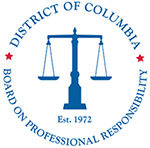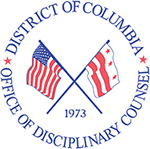- For the Public
- For Lawyers
- Board on Professional Responsibility
- Office of Disciplinary Counsel
- Disciplinary Decisions
-
Attorney Discipline News
- Administrative Order 2020-8: Live Streams of Hearing Committee Proceedings
- Administrative Order 2023-1: Return to In-Person Proceedings
- The Court of Appeals Makes Appointments to the Board on Professional Responsibility
- Amendments to the Rules of the Board on Professional Responsibility
- Amendments to the Rules of the Board on Professional Responsibility
- Volunteer Opportunities
From Washington Lawyer, February 2015
By Bill Ross
There were big changes last year in the District of Columbia: marijuana was decriminalized, the medical marijuana system was expanded, and on November 4 the electorate approved a ballot measure to legalize possession and cultivation of small amounts of marijuana by adults. There have already been congressional efforts to block implementation of the legalization initiative, and there will likely have been many more events by the time you read this article. Even if legalization efforts are thwarted, it is likely that the District’s medical marijuana program will still continue. All of these developments create a sticky situation for lawyers for one very important reason: marijuana is still illegal under federal law.
Rule 1.2(e) of the Rules of Professional Conduct forbids a lawyer to counsel a client to engage, or assist a client, in conduct that the lawyer knows is criminal. The tension between local and federal law places lawyers in a very precarious position. Colorado recently amended its ethical rules to address this specific situation and make it clear that Colorado lawyers may assist clients in conduct permitted under the laws implementing marijuana legalization in that jurisdiction.[1] No such safe harbor is carved out under the District of Columbia Rules. Further, in joining the Bar, all lawyers take an oath to support the Constitution of the United States, and by extension, federal law.[2]
Further, D.C. Bar R. XI, § 10, requires lawyers to self-report criminal convictions. The potential tension between local and federal law (or the law of the majority of states) means that lawyers might find themselves criminally prosecuted, and, thus, potentially face disciplinary sanctions for conduct that would not violate District of Columbia law. As far as we know, no jurisdiction has yet clarified how disciplinary systems should handle this tension.
By now you’re undoubtedly hoping that this is the part of the article where the clouds part and everything is neatly resolved. Alas, it is not. Although the U.S. Department of Justice has issued a series of guidance memos indicating that the federal government typically defers to state and local governments for enforcement of their own laws regarding marijuana unless the conduct implicates one or more stated enforcement priorities, several of these enforcement priorities present unique challenges in the District of Columbia.[3] Because the District is a relatively small urban jurisdiction surrounded by states where marijuana remains illegal, the federal government could determine that marijuana legalization here presents a greater risk of cross-border movement of marijuana than in larger jurisdictions like Colorado or Washington State. Similarly, the District of Columbia has significant public lands interspersed throughout its limits. Practitioners should pay attention to see if the Department of Justice updates its guidance in light of the recent changes to District of Columbia law.
One thing that is clear in this area of conflicting laws is that, at a minimum, lawyers need to Mirandize their clients by highlighting the fact that many acts relating to marijuana that may be legal under local law remain illegal under federal law. There is a gray area and it appears that it may be impossible to advise clients on how they can comply with local laws without also violating federal law. By making it clear that certain actions remain federal crimes and that the scope of your advice is limited to compliance with local laws, you may be able to assist your clients while still fulfilling your ethical obligations.
Bar Counsel is not out to prosecute lawyers who, in good faith, assist clients in conduct that is in strict compliance with District of Columbia law. Until such time as we have more guidance on the ethical boundaries in this area, we anticipate exercising discretion similar to that laid out in the Department of Justice guidance memos. Similarly, while the attorney may soon be able to legally partake in marijuana in the District of Columbia, our office will not hesitate to step in if an attorney’s marijuana use adversely affects his or her ability to ethically and competently practice law.
This whole topic has undoubtedly stressed you out. Luckily, there are a few things that can help relax your nerves when you are faced with these difficult ethical issues. Obviously, I am referring to the Bar’s Ethics Hotline for informal ethics advice at 202-737-4700, ext. 3231, 3232, or 3198, or the multitude of excellent Continuing Legal Education Program courses offered by the D.C. Bar at www.dcbar.org/marketplace.
Bill Ross serves as assistant bar counsel for the District of Columbia.
Notes
[1] Lindsey Bever, Colorado Lawyers Get the Green Light on Pot Business Clients, Wash. Post, Mar. 25, 2014.
[2] “I, _____, do solemnly swear (or affirm) that as a member of the Bar of this court, I will demean myself uprightly and according to law; and that I will support the Constitution of the United States of America.” D.C. App. R. 46(i) (Admission to the Bar).
[3] The enforcement priorities relate to protection of minors, prevention of funding of criminal enterprises, prevention of marijuana being diverted to jurisdictions where it remains illegal, prevention of violence, and prevention of cultivation or use of marijuana on public lands. Cole Memorandum, Aug. 29, 2013.
Disciplinary Actions Taken by the District of Columbia Court of Appeals
Original Matters
In re Dana W. Johnson. Bar No. 420592. November 13, 2014. The D.C. Court of Appeals found that Johnson, a disbarred attorney, filed four affidavits that did not comply with Rule XI, § 14(g), and he, therefore, was not eligible for reinstatement. The board properly dismissed his petition for reinstatement.
Reciprocal Matters
In re Scott B. Blumenfeld. Bar No. 501870. November 26, 2014. In a reciprocal matter from Maryland, the D.C. Court of Appeals imposed functionally equivalent reciprocal discipline and suspended Blumenfeld for six months with fitness, nunc pro tunc to November 14, 2014. In Maryland, Blumenfeld was found to have failed to properly supervise nonlawyers, split fees with nonlawyers, failed to maintain client funds in trust until earned, and failed to properly maintain trust account records.
In re Laura E. Jordan. Bar No. 416707. November 26, 2014. In a reciprocal matter from Maryland, the D.C. Court of Appeals imposed functionally equivalent reciprocal discipline and suspended Jordan for 18 months with fitness, nunc pro tunc to August 18, 2014. In Maryland, Jordan consented to discipline and was found to have failed to file income tax for multiple years, failed to competently and diligently represent an estate, made misrepresentations to a court to cover up her lack of diligence or competence, and negligently misappropriated entrusted funds.
In re Evan Scott Kagan. Bar No. 994528. November 26, 2014. In a reciprocal matter from Florida, the D.C. Court of Appeals imposed identical reciprocal discipline and suspended Kagan for 90 days, nunc pro tunc to October 16, 2014. Kagan consented to discipline in Florida and was found to have failed to perform services sufficient to justify the fees charged in debt consolidation matters.
In re Robert Wilkey. Bar No. 975432. November 26, 2014. In a reciprocal matter from Pennsylvania, the D.C. Court of Appeals imposed functionally equivalent reciprocal discipline and suspended Wilkey for 30 months with fitness, nunc pro tunc to September 24, 2014. Wilkey consented to discipline in Pennsylvania and was found to have committed the offense of identity theft.
Interim Suspensions Issued by the District of Columbia Court of Appeals
In re Brian J. Benner. Bar No. 446757. November 4, 2014. Benner was suspended on an interim basis based upon discipline imposed in Michigan.
In re Emerson V. Briggs III. Bar No. 446158. November 10, 2014. Briggs was suspended on an interim basis based upon discipline imposed in New York.
In re Allen Brufsky. Bar No. 64956. November 12, 2014. Brufsky was suspended on an interim basis based upon discipline imposed in Florida.
In re Dale E. Duncan. Bar No. 370591. November 10, 2014. Duncan was suspended on an interim basis based upon discipline imposed in Virginia.
In re J. Michael Farren. Bar No. 368895. November 12, 2014. Farren was suspended on an interim basis based upon conviction of a serious crime in Stamford Superior Court in Connecticut.
In re Darrell N. Fuller. Bar No. 499204. November 10, 2014. The D.C. Court of Appeals vacated Fuller’s section 10(c) suspension and reinstated him to the D.C. Bar. The court further ordered that the matter be referred to Bar Counsel pursuant to D.C. Bar Rule XI, § 8(a), for whatever action it deems appropriate.
In re Mark A. Sgarlata. Bar No. 418557. November 4, 2014. Sgarlata was suspended on an interim basis based upon his conviction of a serious crime in the Circuit Court of Loudon County, Virginia.
In re Jared E. Stolz. Bar No. 489626. November 4, 2014. Stolz was suspended on an interim basis based upon discipline imposed in New Jersey.
The Office of Bar Counsel compiled the foregoing summaries of disciplinary actions.
Informal Admonitions issued by Bar Counsel and Reports and Recommendations
issued by the Board on Professional Responsibility are posted at
www.dcattorneydiscipline.org. Most board recommendations as to discipline are
not final until considered by the court. Court opinions are printed in the Atlantic Reporter and also are available online for decisions issued since August 1998. To obtain
a copy of a recent slip opinion, visit www.dccourts.gov/internet/opinionlocator.jsf.
- For the Public
- For Lawyers
- Board on Professional Responsibility
- Office of Disciplinary Counsel
- Disciplinary Decisions
-
Attorney Discipline News
- Administrative Order 2020-8: Live Streams of Hearing Committee Proceedings
- Administrative Order 2023-1: Return to In-Person Proceedings
- The Court of Appeals Makes Appointments to the Board on Professional Responsibility
- Amendments to the Rules of the Board on Professional Responsibility
- Amendments to the Rules of the Board on Professional Responsibility
- Volunteer Opportunities

- Board on Professional Responsibility
- 430 E Street NW
- Suite 138
- Washington, DC 20001
- Phone: 202-638-4290
- Fax:

- Office of Disciplinary Counsel
- District of Columbia Court of Appeals
- 515 5th Street, NW
- Building A, Suite 117, Washington, DC 20001
- Phone: 202-638-1501
- Fax: 202-638-0862

